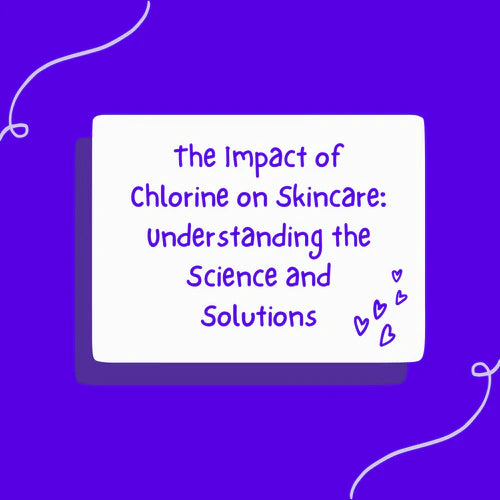

· By filter genius
The Impact of Chlorine on Skincare: Understanding the Science and Solutions
Chlorine is a chemical commonly used to disinfect water in order to kill bacteria, viruses, and other microorganisms. While it is an important tool for making water safe for consumption, high levels of chlorine in water can have negative effects on the skin. We will discuss the science behind chlorine and its effects on the skin, as well as ways to reduce exposure and protect the skin from chlorine damage.
The Chemistry of Chlorine in Water
When chlorine is added to water, it forms hypochlorous acid (HOCl) and hypochlorite ions (OCl-). These forms of chlorine act as powerful oxidants and can attack and damage cell membranes, proteins, and DNA. They also have the ability to react with natural compounds found in the skin, such as amino acids and fatty acids, which can lead to further damage.
The Effects of Chlorine on the Skin
Exposure to high levels of chlorine in water can lead to a number of skin issues, including:
-
Dryness: Chlorine can strip the skin of its natural oils, leading to dryness and irritation.
-
Allergic reactions: Some people may experience allergic reactions to chlorine, such as redness, itching, and rash.
-
Age spots: Chlorine can cause the formation of age spots, which are also known as liver spots or solar lentigines, caused by the accumulation of pigmented cells in the skin.
-
Wrinkles: The drying effect of chlorine can lead to wrinkles and fine lines.
-
Discoloration: Chlorine can leave stains on skin and clothing.
-
Eczema: Chlorine can cause the itchy, red patches of eczema.
Solutions for Reducing Chlorine Exposure
To reduce exposure to chlorine in water and protect the skin, there are several solutions:
-
Install an activated carbon filter: An activated carbon filter can remove chlorine from the water before it reaches your skin.
-
Take shorter showers: The longer you spend in the shower, the more chlorine you're exposed to.
-
Use a moisturizer: To keep the skin hydrated, it is important to use a moisturizer after bathing or showering.
-
Use a humidifier: Chlorine can also dry out the air in your home, so using a humidifier can help to keep the air moisturized, which can help to keep your skin hydrated as well.
-
Use distilled water: Distilled water is free from chlorine and other impurities, which can be helpful for skin that is particularly sensitive to chlorine.
-
Use a chlorine neutralizer: Some products specifically designed to neutralize chlorine can be added to bathwater or shower water to help protect the skin from chlorine exposure.
Conclusion
Chlorine is an important tool for making water safe for consumption, but exposure to high levels of chlorine in water can have negative effects on the skin. By understanding the chemistry and biology behind chlorine and its effects on the skin, as well as taking steps to reduce exposure, you can help to protect your skin from chlorine damage. Whether you choose to install a shower filter, use a moisturizer, or switch to distilled water, there are plenty of solutions available to help you combat the effects of chlorine on your skin.
